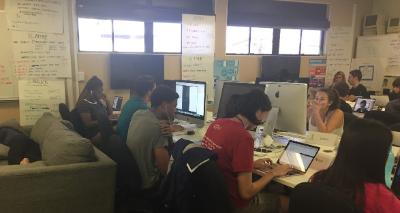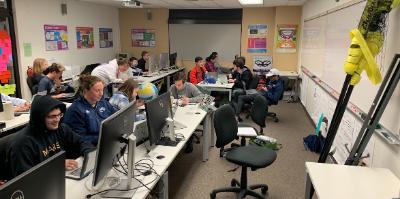In addition to numerous laboratories and spaces provided by the college, LMU's Computer Science Program maintains three laboratories for study, research, and events. All are located on two floors within a single building, adjacent to a grassy field where volleyball, soccer, frisbee, and football are frequent healthy breaks from study and work.
-
The Keck Lab is the department's primary general-use lab and to a large degree is the hub of the undergraduate social scene. Students come to the lab to work, collaborate, and study every day of the week. Here you will find ample comfortable work spaces on tables with power supplies, additional monitors, and a handful of iMac desktop computers. Students can also work on two large and comfortable couches, take a study break on one of the many gaming platforms (Kinect, PS4, Wii, and XBox), or jam on the Fender Starcaster (headphones generally required). You'll also find the department's server rack here; aspiring devops might, once hired as a TA, gain access to monitor the CS subnet.
The lab's audio visual system adds quite a bit to the lab culture, allowing for some light tunes when the lab is sparsely populated; some three-projector research or class presentations; or even a fun movie night.
Teaching assistants are available Monday through Friday for help with just about anything.

The Keck Lab is also the venue for social events such as the beginning of the year welcome lunch, student-run internship workshops, movie nights, and our Google CSSI Extension summer program.
-
Adjacent to the main Keck Laboratory through double glass doors is a smaller, and generally quieter lab. The "Annex" as it's called also features a three-screen multimedia system, and serves as the venue for some of the smaller lab and seminar classes, and student-run "lunch and learn" sessions. An electronic keyboard graces the back corner for those that want a little piano practice and set the mood for study or social time.

-
The LMU ACT Lab is oriented to providing students with powerful, research-grade computing hardware enabling the pursuit of projects within the domains of modern machine learning and artificial intelligence. Equipped with ten high-end workstations, the lab serves both as a sandbox for exploring state-of-the-art techniques and a development center for students conducting their own, original research. Advised by Professor Andrew Forney, the lab entertains a wide swath of student interests, including applications in autonomous art generation and game-playing agents, theoretical endeavors marrying reinforcement and causal learning, and LMU mission-centered projects with positive social impact such as apps for self-harm prevention and systems for online-media political-bias detection.